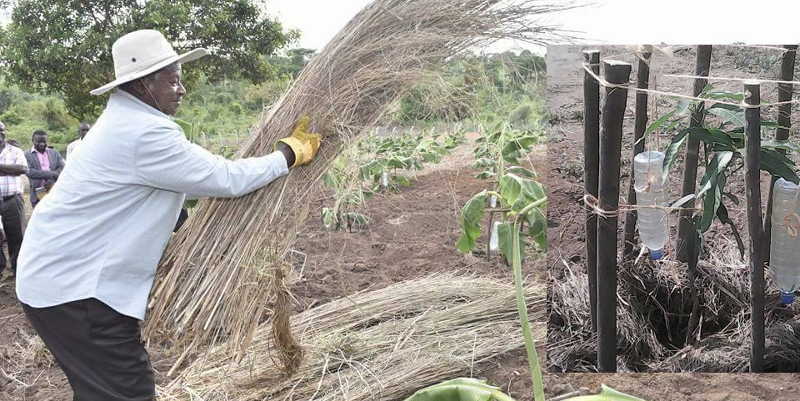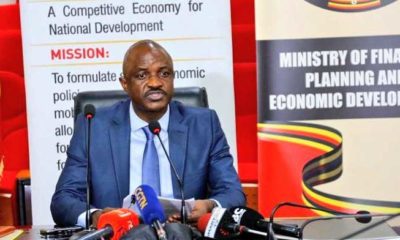Editor
Blame NRM for increased inequality
Uganda’s inequality did not just happen; it was created by NRM’s unfettered markets and politics!

President Museveni has come under attack for promoting primitive technologies of using hand hoes and bottle irrigation’ (as shown inset photo) compared to modern ones like the use tractors and solar irrigation in his home region of Ankole
When I started writing this column some 10 years ago, “SAPs will never alleviate poverty in Uganda until government swaps places with donors,” I explained a paradox that was blotting Uganda’s good economic reform legacy.
I wrote that although the NRM government was deservedly receiving the plaudits for its sound economic policies (keeping inflation in single digits for nearly two consecutive decades, sustaining growth at an average rate of 7% for two sold decades), attracting foreign investments etc.), the expected benefits of these reforms and the resultant growth were not reaching the poor, particularly in the rural areas.
In mid-2000s, a research by three German professors, Robert Kappel, Jann Lay, and Susan Steiner, entitled “Uganda: No more pro-poor growth?” also found that the poor in Uganda were no longer benefiting from the continued growth of the economy. That growth was now going to very few people who were already rich.
Ten years later, Oxfam international issues a report that reveals in the past couple of decades the richest 10% of Ugandans have seen their incomes grow by 20% (making them own 36% of the country’s wealth) while the poorest 10% have seen their dwindle 2.5% of the national pie. In short, in Uganda, despite the progress in reducing ‘headcount’ poverty, the rich have become richer while the poor are becoming poorer.
‘Steady-progress’ for a few
This is the song I have been singing in these pages for years. In July 2007, I wrote in these pages a piece entitled, “In Uganda the rich have markets; the poor have bureaucrats.” In the piece, I decried the NRM government’s ‘unstrategic’ policy of concentrating its energies and resources on short-term interventions instead of investing in holistic programs that not only ensure higher growth of the economy, but also automatic redistribution.
First, these interventions, such as Youth Livelihood Fund, Bonna Bagaggawale, etc., are like the Titanic with too few lifeboats: people rush for the lifeboats (read, the little money), and definitely millions of them are often out of luck. After realizing that a lot of people have been left out in the “Steady Progress”, government resorted to fire-brigading interventions.
Second, the very reforms that helped accelerate growth of Uganda’s economy also created conditions that continue keeping the benefits going to very few individuals. There is no doubt that the economic polarisation in Uganda is being reinforced by the unfettered market economic system that the NRM chose to guide our economy.
In 2006, I was part of the audience at Makerere University Main Hall when Emmanuel Tumusiime-Mutebile, the Governor Bank of Uganda, said, “Let those who have eyes to see where money is amass it”.
I silently wondered, “What about those without the ‘eyes’”? I wrote in these very pages that if Mutebile thought the latter group will just look on as “those who have the eyes the money” are enjoying, he lied to himself. Lately, Kampala and other towns are becoming more insecure. The rich are no longer sleeping.
The rich are not sleeping
They (the rich and powerful) now spend sleepless nights roaming around their beautiful houses to ensure the poor, unemployed, hungry and now angry folks “without the eyes to see where money to amass is” do not break into their homes.
Like I usually bring to the attention of those who choose to care about these issues, every nice house in Uganda is enclosed in a tall perimeter. On top of the perimeters are electrified wire obstacles, permanently watched by armed guards and a pride of dogs. All inlets into the house (doors, windows, and ventilators) are fitted with burglary proof and locked with massive padlocks!
To the privileged folks, such as politicians and tycoons, not even that detail is secure enough; so they sleep with a hand weapon – a pistol. Those who are lower in ranking sleep with a panga or machete, or at least a big stick somewhere near the pillow.
What do Ugandans fear? They know that out there are young men and women who are not only hungry but also feel deprived and cheated by those who have materials possessions and other unfairly distributed opportunities.
So they can easily break into their beautiful homes uninvited at midnight or thereafter and harm them. In the end, the poor do not sleep because they are hungry, and the rich do not sleep because the poor are awake.
Rising cost of living
I often tell people that everyone benefits from equality. And to build equal or unequal societies comes down to choice. Equal societies chose equity and equality; unequal societies chose inequity and inequality.
Without caring about the millions of the youth roaming the streets of Kampala and other towns unemployed, the freedom of the few Ugandans who have escaped poverty remains temporary.
Mr. President, the neo-liberal economic system that was forced on your government has worsened inequality. The unregulated markets have dragged the country into a situation where prices of everything; food, water, electricity, fuel, and medicine have risen.
Predictably, this has led to rising cost of living. Life is not good at all for the young people that are earning very meagre salaries yet the prices of the goods and services they buy are rising exponentially.
Uganda’s real economic problem today is not necessarily poverty; it’s inequality. When government hired Oxford Policy Management to evaluate the performance of the Poverty Eradication Action Plan (PEAP), the UK policy research firm found an interesting fact: poverty and inequality in Uganda had moved in the same direction during the PEAP period (1997 – 2010).
The rich don’t pay tax!
The reason for this is simple: government’s public expenditure increased the incomes of the upper quintile of our society – government workers and a few other elite connected with government, at the expense of the masses.
The PEAP 2004/05–2007/8 projected that had the Gini-index stayed around 39% over the decade after 2007, poverty in Uganda would have fallen to 10% by 2017 (today). It is estimated at 19.7% at $1 and 34% at $1.9. This shows that Uganda’s foremost economic problem is not poverty but rising inequality.
Studies show that politicians pay little attention to distribution of income and wealth. In Uganda, and admittedly many other unequal countries, the rich do not pay tax (they evade or avoid tax because of their political connections) and those in the lower income echelon shoulder the tax burden.
The rich are the “investors” that government has over the years extended tax breaks, financial bailouts, and free investment land often grabbed from the poor and the powerless. The perpetuation of indirect taxes, such as VAT, has made taxation more regressive.
True indirect taxes helped Uganda to reduce the challenges of compliance (indirect taxes are difficult to evade or avoid); the problem is that they tend to tax the poor more. When Mr. Sudhir Ruparelia buys a kilo of sugar, he pays 18% VAT. The same tax is collected from some old widow in Katakwi or Butambala with a daily income as low as UGX 5,000. This perpetuates inequality.
Need for distributive justice
One unfortunate policy embraced by your government, Mr President, is that of taxing the poor to compensate the rich. Data from African Tax Justice Network, shows that the poor in Uganda, Kenya, Tanzania and Rwanda alone pay a total of US$2.8 billion every year to their governments which they use as tax incentives to multinational companies! This certainly perpetuates inequality, and it’s unfair.
Mr. President, your government failed to make commitment for reducing inequality under the Millennium Development Goals. This is the reason inequality escalated. And like I warned you seven years ago, high and rising inequality, although a result of progress, can easily stop progress.
You should not repeat this mistake (of neglecting distribution) under the Sustainable Development Goals (SDGs). Government must show commitment to the first target of SDG No.10, which seeks to ensure that income growth among the poorest 40% of the population is more rapid than national average.
To achieve this Mr. President, your government must regulate the capitalism to ensure distributive justice. I understand concepts like “distributive justice” are not within the purview of neoclassical economics professed by your economists at Bank of Uganda and Finance.
You need to tell them, Mr. President, that this is not metaphor: Uganda is sitting on a time bomb. The battles we are watching in streets today are not political battles. No. We are watching an economic war between the haves and have-nots.
Myth of trickle-down economics
Tell your economists and other policy advisers that we have tried their “casino economics” – the neo-liberal economics where government intervention in the economy is supposed to be bad and free unfettered markets are good. It does not work. It’s time we tried the “economics that works” – economics that targets improvement of the well-being of the poor.
Uganda needs more social reforms – reforms that put money in the pockets of the poor. I know many Western-trained economists think that equality and equity are economic fallacies. Tell them that actually it is their favorite trickle-down economics – targeting growth and low inflation which is fallacy.
Countries that have ensured that income redistribution strategies triumph have tended toward egalitarianism, and in the process have created more livable societies. Scandinavians are not richer than the Americans or the English, but they have created more livable societies through pursuit of equality, or at least equity as a goal.
Mr. President, inequality does not just happen; it is created and political forces explain much of today’s inequalities. Not my words; Nobel Laureate Joseph Stiglitz established this in a recent research (2012).
Comments



























